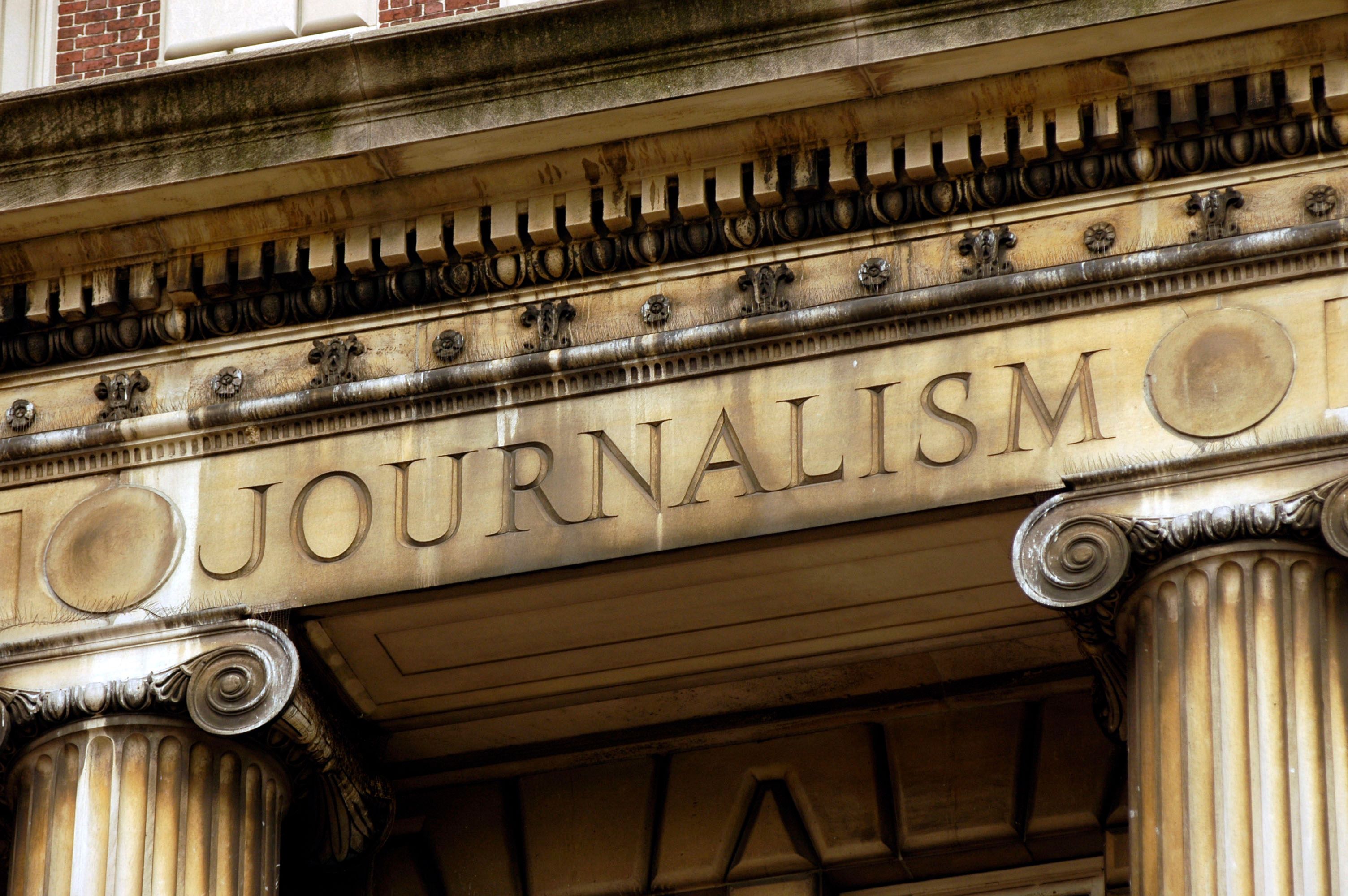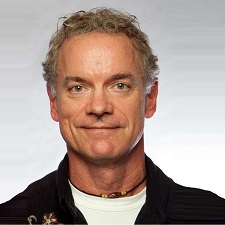عندما قرر جوزيف بوليتزر - أحد أقطاب الصحافة الأمريكية - أن يؤسس كلية للصحافة في أوائل القرن العشرين، قدم فكرته إلى جامعة هارفارد، التي رفضت فكرته بشكل قاطع معللة رفضها بأن الصحافة حرفة كالتجارة وليست مهنة مكتسبة بالتعلم مثل القانون أو الطب. حينها أخذ بوليتزر فكرته (وأمواله معه) إلى جامعة كولومبيا بدلاً من ذلك، ومنذ ذلك الحين تعُرف كلية الصحافة هناك بأنها واحدة من أفضل كليات الصحافة في العالم. وكما هو الحال في نظيرتها جامعة نورث ويسترن، التي أعمل فيها، فإن خريجي جامعة كولومبيا يُعرفون بامتلاكهم تجربة احترافية، وليس بمعرفتهم بنظرية الصحافة أو تاريخ الاتصال الفعال فحسب. وتختلف كليات الصحافة عن كليات القانون أو الطب من هذا النوع، حيث يُتوقع من خريجيها الحصول على مهاراتهم المهنية في برامج الإقامة الخريجة و/أو التدريبات الصيفية، ويجب عليهم بعد ذلك أن يجتازوا امتحانًا للحصول على الترخيص لممارسة المهنة. في معظم الأماكن، بالطبع، لا يحتاج الصحفيون إلى ترخيص للممارسة، ولا حتى التعليم في كلية الصحافة. فالترخيص لممارسة المهنة أو النشر هو في كل مكان بداية الرقابة الحكومية، والعديد من الصحفيين المتميزين لم يدرسوا الصحافة -كتخصص في كلية صحافة ما- أبداً.
وبناء على هذه الأسباب وغيرها، فإن الجدل حول ما يشكل منهجًا صحيحًا للصحافة قديمٌ بِقِدَم التعليم الصحفي نفسه، وفي الحد الذي يفترض فيه أن تُعد كليات الصحافة الطلاب للوظائف في المجالات الصحفية المختلفة، فسيظل الجدل حول مناهج تعليم الصحافة قائماً دائمًا، مدفوعًا بالتغيرات في الاقتصاد والهندسة المعمارية من حولنا، بواسطة المعايير المتغيرة والقوانين المتنوعة. ففي الولايات المتحدة، كان الجدل الذي بدأ مع بوليتزر موضوعًا للبحث والتركيز لمدة 40 عامًا على الأقل من الجامعات ومؤسسات الصحافة التي تستضيفه. وإنني، بوصفي أستاذاً في الصحافة، شاركت في عدة مراجعات وتصويبات للمناهج، فإنه دائمًا ما كان المنهج "الكامل" يستغرق عقدًا من الزمن لإتمامه - وهو أمر غير عملي. وأثناء عملي كمراسل في دول عدة مثل قطر وغواتيمالا وأوكرانيا، فأعلم أيضًا أن التعليم الصحفي، كالحرفة نفسها، يجب أن يكون مبنياً على عمق ثقافي.
عندما قرر جوزيف بوليتزر أن يؤسس كلية للصحافة في أوائل القرن العشرين، قدم فكرته إلى جامعة هارفارد، التي رفضت فكرته بشكل قاطع معللة رفضها بأن الصحافة حرفة كالتجارة وليست مهنة مكتسبة بالتعلم مثل القانون أو الطب.
وبما أن تركيز النقاش اليوم يتمحور حول التعليم الصحفي في العالم العربي، فستكون ملاحظاتي مبنية على تجربتي الشخصية في هذه المنطقة العربية، سواء كصحفي أو كمسؤول تنفيذي وعضو هيئة تدريس في جامعة نورثويسترن في قطر. لقد درست طلاباً من جنسيات متعددة ومن جميع أنحاء منطقة الشرق الأوسط وشمال أفريقيا ومن حول العالم بالتحديد من 61 دولة مختلفة، من الجزائر إلى زامبيا. ونظرًا لهذا التنوع، ولبيئات الصحافة التي سيعود إليها هؤلاء الطلاب، فليس من الواضح ما يجب أن يكون عليه المنهج المناسب في كليات الصحافة في بلدانهم، (وخصوصًا بالنسبة لي، حيث أقوم بتدريس قانون الإعلام).
وأعتقد بشدة أن كليات الصحافة في هذه المنطقة يجب أن تركز على الممارسة العملية، وبالتحديد على النشر المهني الدوري، وأنا هنا لا أرغب في أن يتظاهر طلابي بممارسة الصحافة من خلال كتابة قصص أو إنتاج برامج لا يقرؤها أو يشاهدها أحد خارج الجامعة.
ووفقًا لمصدر أكاديمي، فإن هناك 135 برنامجًا جامعيًا في العالم العربي يقدمون دراسات في الصحافة، أغلبها بدأت فقط في العشرين عامًا الماضية استجابة للنمو الهائل لصناعات الإعلام في المنطقة في الفترة نفسها. وتوجد أقدم كلية صحافة في المنطقة في جامعة القاهرة وهي التي بدأت بتدريب الصحافة في عام 1935. أما اليوم، فلدى مصر 19 برنامجًا جامعيًا لتعليم الصحافة. أما كليات الصحافة في دول الخليج، فلدى الإمارات 19 كلية والمملكة العربية السعودية 7 كليات. وفي قطر، بالإضافة إلى نورث ويسترن، تقدم كل من جامعة قطر ومعهد الدوحة للدراسات العليا درجات أكاديمية في الصحافة. وهناك أيضًا العديد من برامج التدريب في المنطقة، مثل الجزيرة ويورونيوز، على سبيل الذكر هذين البرنامجين، والعديد منها يتم تقديمه في شراكة مع الجامعات الغربية.
قبل ظهور البرامج الخاصة، كانت معظم كليات الصحافة تحت سيطرة الحكومات، وكان هدفها الرئيسي تحضير الطلاب لترويج مصالح الدولة بشكل رئيسي.
وتتفق الدراسات حول التعليم الصحفي الجامعي في الشرق الأوسط عمومًا على أنه ليس ذا جودة عالية. وقبل ظهور البرامج الخاصة، كانت معظم كليات الصحافة تحت سيطرة الحكومات، وكان هدفها الرئيسي تحضير الطلاب لترويج مصالح الدولة بشكل رئيسي. واليوم، توجد العديد من البرامج الخاصة الجديدة، بما في ذلك البرنامج الذي أديره حيث تعتمد ميزانياته التشغيلية بشكل كبير أو كلي على التمويل الحكومي. ومن الانتقادات الشائعة للجامعات الخاصة الجديدة هو أن مناهجها الأساسية تعتمد على نموذج "غربي" غير مناسب تمامًا للثقافة والمنطقة العربية، والانتقاد الثاني هو أن هذه الكليات تُولي الأهمية للجانب "النظري" على حساب "التدريب العملي"، وهو انتقاد دارج للتعليم الصحفي في جميع أنحاء العالم.
فماذا الذي سأفعله بشكل مختلف، خصوصًا هنا في قطر؟
تمكين الصحافة الطلابية: أولاً، يمكن أن تبدأ النشر التخصصي للطلاب بواسطة دار نشر طلابي، ولكن يجب أن يكون هذا النشر مستقلاً قدر الإمكان عن إدارات الكليات، التي ستميل طبيعيًا لصالح مصالحها بغض النظر عن مستوى محتواها على أي نوع من التقارير النقدية. ويمكن أن تقدم الصحافة الطلابية خدمة حيوية للمجتمع، ففي الولايات المتحدة - على سبيل المثال - كشف الصحفيون من الطلاب العاملون في نورثويسترن وستانفورد عن قصص رئيسية في العام الماضي أدت إلى فصل مدرب كرة القدم واستقالة رئيس جامعة.
تطوير العلاقات المهنية مع مؤسسات الصحافة والحفاظ عليها: والأهم من ذلك، يجب أن يحوي النشر التخصصي للطلاب علاقات مع مؤسسات الأخبار المهنية، سواء كان العمل مع الجزيرة، أو الاتحاد الدولي للمحققين الصحفيين، أو واشنطن بوست أو أي مؤسسة أخرى، فطلاب الصحافة يحتاجون إلى الكتابة أو الإنتاج للنشر الحقيقي، وليس التظاهر بأنهم كذلك. وإذا لم يكن لديهم سيرة ذاتية تظهر هذا النوع من العمل فلن يحصلوا على وظائف، وبالطبع لن يحصلوا على وظائف جيدة.
من الانتقادات الشائعة للجامعات الخاصة الجديدة هو أن مناهجها الأساسية تعتمد على نموذج "غربي" غير مناسب تمامًا للثقافة والمنطقة العربية.
التمييز بين التغطية و"المحتوى": الصحافة الأفضل تتعلق بالتغطية الأفضل وتتعلق بالبحث والحصول على المصادر، سواء كانت وثائقية أو بشرية، وتعلم كيفية الحوار وأخذ المعلومات منهم. التغطية هي مجموعة من المهارات التي لا يمكن استبدالها بالذكاء الاصطناعي، حتى إذا تم تكييف الذكاء الاصطناعي للاستخدامات صحافة التحقق. والتغطية وكتابة التقارير التحقيقية - "المحتوى" الأكثر أهمية - هو اليوم عالمي ومتشابك وتعاوني. ويحتاج الطلاب إلى الانغماس في هذا العالم كجزء من تعليمهم المهني. وبالإضافة إلى هذه التوصيات، أدرك أن هناك بعض الاعتبارات العملية، وسأذكر اثنين منها.
تُعد قوانين الإعلام التي عفا عليها الزمن عائقًا حقيقيًا أمام تعليم الصحافة: ففي جميع أنحاء الشرق الأوسط، بما في ذلك قطر، تعدّ العديد من قوانين الإعلام إرثاً لمخلفات الاستعمار. وهذه القوانين قمعية، وقد تدهورت البيئة القانونية للصحافة في المنطقة خلال العقد الماضي بسبب إصدار قوانين الجرائم الإلكترونية وقوانين الأخبار الكاذبة التي غالبًا ما تجرم الانتقاد للحكومة، وهذه القوانين تعمل من الصحافة الطلابية نشاطًا محفوفًا بالمخاطر، ليس فقط بالنسبة للطلاب، ولكن أيضًا بالنسبة لمستشاريهم وللمسؤولين في الجامعات عن هذه البرامج.
إن معرفة بعض نظريات الصحافة وتاريخ الاتصال مهمة: وهذا صحيح في كل مكان، ولكن بشكل خاص في الشرق الأوسط حيث شهدت صناعات الاتصالات ازدهارًا خلال العقود القليلة الماضية. وفي الوقت نفسه، لا يمكن أن يكون هذا هو المنهج الدراسي كله، فالهدف يجب أن يكون إعداد الطلاب للوظائف في مجال الصحافة، كما أنه لا يعني لطلاب الصحافة ألا يتلقوا تدريبًا أكاديميًا في مجالات أخرى، سواء كانت البيولوجيا أو العلوم السياسية أو القانون. في كثير من الأحيان يتم انتقاد الصحفيين الأمريكيين - وبحق - لاعتقادهم أن الجهل الموضوعي يضمن الحياد المهني، ولكن هذا ليس صحيحًا، فهو يضمن الجهل فقط.
أدرك تمامًا أن كليات الصحافة قد تكون مكانًا يعارض التفكير المنطقي، وأنا حساس أيضًا للرأي الذي سمعته من مسؤولي الجامعات (متفقين مع رئيس هارفارد من عصر آخر) بأن تعليم الصحافة ليس مناسبًا للجامعات، ولكن يجب ألا تكون كليات الصحافة برامج دراسات ثقافية فقط، أو تمارين أكاديمية معزولة عن الجماهير التي يدعي الصحفيون خدمتها. فالصحافة تتعامل، مثلما هو الحال مع الجزء الكبير الآخر من الجامعة الحديثة، مع فكرة القيم العالمية، ولكن على عكس باقي أقسام الجامعة، وهذا لصالحها، فإنها تفعل ذلك علنًا، وهذه ميزة يستحق المحافظة عليه.












![Palestinian journalists attempt to connect to the internet using their phones in Rafah on the southern Gaza Strip. [Said Khatib/AFP]](/sites/default/files/ajr/2025/34962UB-highres-1705225575%20Large.jpeg)



























